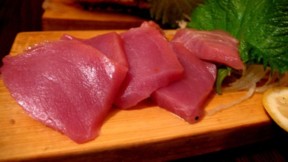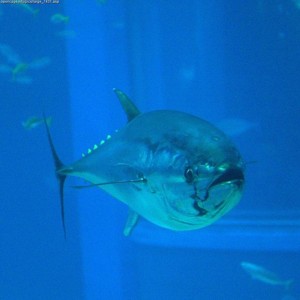With northern bluefin populations falling dramatically, a proposal by Monaco to prohibit sale under the Convention on International Trade in Endangered Species has won US support, but not Australia's.
The Atlantic, or northern bluefin tuna has lost 72 per cent to 82 per cent of its original stock is under pressure also from illegal or unregulated fishing for the sashimi trade.

(Photo: Northern Bluefin or Thunnus thynnus)
Japanese, Korean, Indonesian and Taiwanese Bluefin tuna fleets use long line fishing which results in the incidental deaths of thousands of seabirds, particularly petrels and albatross.
However, the Australian Government has decided not to support a global ban on the trade of the northern variety of the bluefin tuna. Instead, the Environment Minister, Peter Garrett, has decided to support stronger trade control measures and fisheries management.
Japan, the biggest consumer of the fish, has indicated it may not honour the ban on northern blue fin tuna. Japan says that bluefin is not facing extinction, but acknowledges that recent rates of exploitation are probably not sustainable. Sushi is a popular dish in Japan, where fatty bluefin – called o-toro – sells for as much as 2,000 yen (£13) apiece in high-end Tokyo restaurants. The solution, they insist, is stricter management of fisheries, which have consistently exceeded their own quotas. They feel their "culture is under threat" - a culture of poaching, bullying and powerful lobbying!
The trade ban would allow individual countries to continue to catch atlantic bluefin tuna for domestic consumption. Imports from the East Atlantic and Mediterranean, which could be completely shut down by the threatened ban, would reduce Japan's sources of bluefin tuna by about 20 per cent.

(photo: Northern Bluefin)
The northern bluefin fishery has a poor record of compliance with control measures, and Japan consumes up to 80% of the world's tuna. Japan holds the line on whaling and they are also sending a signal that limits on bluefin tuna aren't up for debate either.
Southern bluefin tuna stocks have also been fished to even more dangerously low levels. Southern bluefin tuna has long been considered endangered and overfished, yet the Australian Government had not reduced the quota given to the Australian southern bluefin tuna industry since 1989.
The Southern Bluefin Tuna is one of the sea's most impressive creatures. A beautiful and powerful fish, it is well suited to a long life endlessly swimming the open seas. An adult Bluefin grows to around 200 kg and over 200 cm long. Its close relative, the Northern Bluefin Tuna, Thunnus thynnus, can grow to a massive 700 kg.
Glenn Slant, global marine program leader for TRAFFIC, a program of WWF, put the situation more bluntly last year: The southern bluefin tuna is at an all-time low, below 10 per cent of its original population size, and what that means is at any time it could collapse.
Our Government supports Japan's illegal whaling through non-action, and now they will be supporting their on-going cultural pursuit of tuna-based sushi eating through non-action and compliance.
The Australian Government continues to sanction fishing of southern bluefin tuna and perhaps is making this decision to block the protection of northern bluefin because it fears embarrassment that we continue to allow fishing of a critically endangered species in our own neighbouring waters.
Every indication is that the Bluefin Tuna population is crashing toward extinction, said Felicity Wade from The Wilderness Society last October. While it is heartening to see governments finally acting on its plight, the 20% international cut is inadequate for the crisis the blue fin tuna is facing. Australia had the largest quota reduction .
If we were serious about bringing this fish back from the brink, concluded Ms Wade, the fishery would be completely closed while populations recovered.
Sea Shepherd plans to oppose illegal bluefin tuna fishing in the Mediterranean region and will employ the same hard-line tactics it uses against Japanese whalers in the Antarctic waters, Paul Watson said.
The decision by Peter Garrett, and Japan, makes mockery of "fisheries management" and principles of "sustainability".

Comments
Tigerquoll
Tue, 2010-03-16 12:50
Permalink
Japan overruled, why can't they farm tuna like they do salmon?
nimby
Fri, 2010-03-19 06:33
Permalink
Fishing economies under threat
Tigerquoll
Fri, 2010-03-19 14:42
Permalink
Japanese claim 'sushi under threat' - now I've heard everything
The Japanese to claim sushi is not under threat is akin to saying the sky will fall in. When they get home the Japanese must really laugh at the bullcrap that western countries and organisations believe.
Australia already sells farmed bluefin tuna to Japan for sushi.
"The southern bluefin tuna (Thunnus maccoyii) farmed in Australia is one of two species of bluefin tunas. Its close relative, the northern bluefin tuna (Thunnus thynnus), is being used to develop tuna farming industries in the Mediterranean, North America and Japan."
Go to Australian Aquaculture Portal
Successive reductions in annual fishing quotas in Australia waters "prompted a move away from canning to value adding through farming. The first experimental farm was established at Port Lincoln in 1991 under a tripartite agreement between the Australian Tuna Boat Owners' Association of Australia, the Japanese Overseas Fisheries Cooperation Foundation, and the South Australian Government. Over the past decade the farmed sector has grown to the point where around 98 per cent of the Australian southern bluefin tuna quota is now farmed.
Farming is undertaken by those operators who have access to part of the Australian quota and who possess the necessary farm lease sites, and the equipment and expertise to catch tuna. There are currently fifteen tuna farms on eighteen sites, which range in size from 20 to 30 hectares.
New areas off Port Lincoln have been opened up from 2003 when there is expected to be twelve farmers operating on twenty-five lease sites."
So all that froth and bubble by Japan at CITES is akin to loggers claiming only 500 year of Eucalytus regnans provide quality woodchips for toilet paper.
Japanese spin is palpable. The 'scientific whaling' crap is more of a con than the Year 2000 bug. The sad thing is that the CITES mob believe them.
Tiger Quoll
Snowy River 3885
Australia
Scott
Fri, 2010-03-19 15:19
Permalink
Tuna ranching vs Tuna farming
Tigerquoll
Fri, 2010-03-19 17:00
Permalink
Isn't bluefin farming renewable and exclusive from the wild?
Scott
Fri, 2010-03-19 20:29
Permalink
bluefin farming
Tigerquoll
Fri, 2010-03-19 23:17
Permalink
Sounds like bluefin 'farming' is disguised poaching
Scott
Sat, 2010-03-20 01:53
Permalink
Ranchin' ain't Farmin'
Protect our mar... (not verified)
Thu, 2010-03-25 09:32
Permalink
Peter Garrett is considering a marine park for our Eastern coast
Add comment